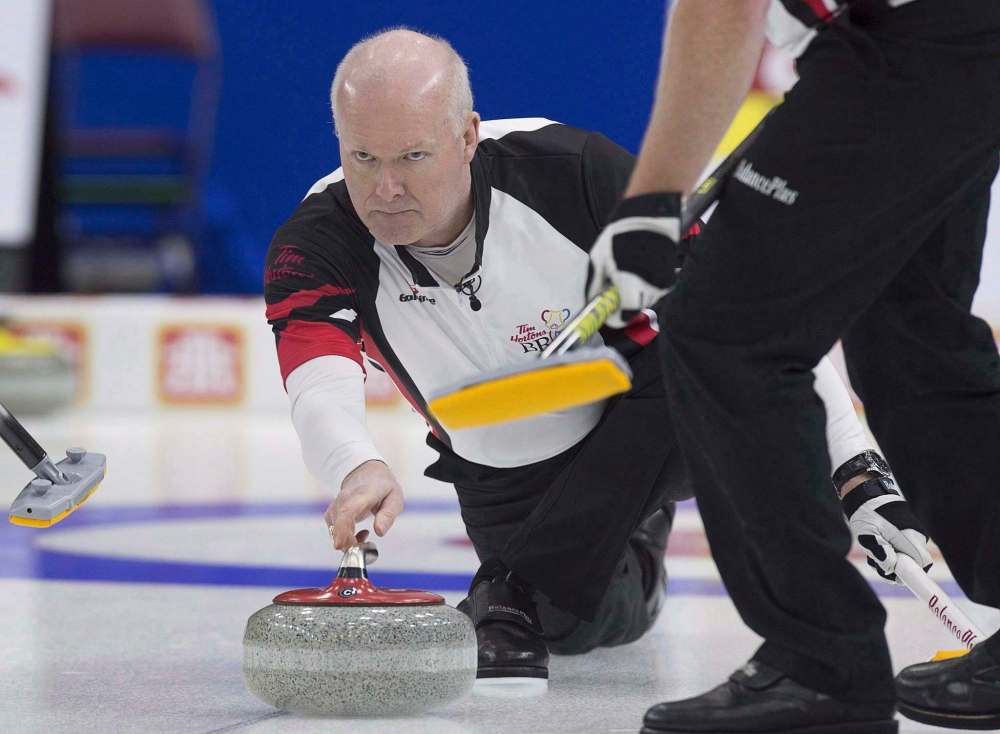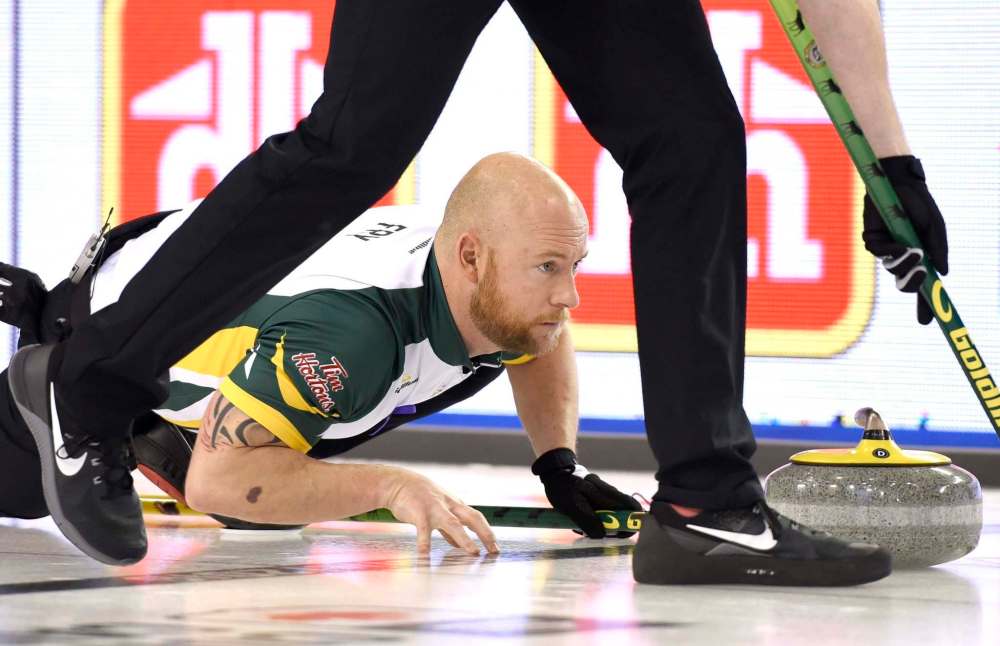Canadian double agents fuel international intrigue… in Olympic curling
Advertisement
Read this article for free:
or
Already have an account? Log in here »
To continue reading, please subscribe:
Monthly Digital Subscription
$0 for the first 4 weeks*
- Enjoy unlimited reading on winnipegfreepress.com
- Read the E-Edition, our digital replica newspaper
- Access News Break, our award-winning app
- Play interactive puzzles
*No charge for 4 weeks then price increases to the regular rate of $19.00 plus GST every four weeks. Offer available to new and qualified returning subscribers only. Cancel any time.
Monthly Digital Subscription
$4.75/week*
- Enjoy unlimited reading on winnipegfreepress.com
- Read the E-Edition, our digital replica newspaper
- Access News Break, our award-winning app
- Play interactive puzzles
*Billed as $19 plus GST every four weeks. Cancel any time.
To continue reading, please subscribe:
Add Free Press access to your Brandon Sun subscription for only an additional
$1 for the first 4 weeks*
*Your next subscription payment will increase by $1.00 and you will be charged $16.99 plus GST for four weeks. After four weeks, your payment will increase to $23.99 plus GST every four weeks.
Read unlimited articles for free today:
or
Already have an account? Log in here »
Hey there, time traveller!
This article was published 18/12/2017 (2920 days ago), so information in it may no longer be current.
He has won, quite literally, all there is to win in curling: money, his province, his country, the worlds and, over two remarkable weeks in Sochi back in 2014, Olympic gold.
And so now, having beaten the curling world on behalf of Canada, Winnipeg’s Ryan Fry is embarking on a new challenge — teaching the curling world how to beat Canada.
Fry, the longtime third for Brad Jacobs Sault Ste. Marie foursome, has accepted a consultant’s position with the South Korea Curling Federation that will see him spend a big chunk of next month in Korea working with that nation’s top curlers in the leadup to February’s 2018 Winter Olympics in Pyeongchang.

As the host nation, Korea will have men’s, women’s and mixed doubles teams competing at the Winter Games and Fry will work with all three in January, sharing with them some of the finer points of the game — on and off the ice — that made him and the rest of the Jacobs foursome Olympic gold medallists in Sochi.
And so with that, a man who spent the last four years trying to get to Korea as a curler so he could defend his gold medal will now, instead, head there as an off-ice consultant for the host nation.
If that sounds like collusion, well, that’s because it is.
And Fry isn’t naive — he knows it’s going to rankle more than a few Canadians that he’s switching sides barely a week after his own team failed to make the playoffs at the Roar of the Rings in Ottawa, where Calgary’s Kevin Koe won the right to represent Canadian men in Pyeongchang.
“I know there will be some people who will look at this and judge me,” Fry told me Monday. “Especially in an Olympic year.
“But I’ve competed and won for Canada, and if I can put a tiny part of my DNA on another country’s team that also wins sometime down the road, that’s my career made for me.”
As Fry sees it, the future of curling is growing the game internationally, and he’s not wrong.
Indeed, I’d argue what’s good for curling is — and always has been — good for Canada.
In fact, curling is an Olympic sport today only because a long line of Canadian curlers before Fry — beginning with another Winnipegger, the late, great Ray Turnbull — went overseas way back in the 1970s and ’80s and set up curling clinics in places such as Korea, Japan and China that had never laid eyes on the sport before.
Those first seeds planted in Asia grew quickly; enough that the World Curling Federation was able to credibly argue to the IOC a decade later that a sport as recently as the 1960s still being played in a meaningful way in only Canada and Scotland was now a worldwide presence worthy of inclusion in the Winter Games.
Curling’s Olympic dream became a reality in 1998 when it became a full Olympic medal sport in, appropriately enough, Nagano, Japan.
Flash forward 20 years and the sport will, for the first time, add a third Olympic medal in Pyeongchang, where the quirky discipline of mixed doubles will join men’s and women’s curling in full medal status.
And so, put it all together and you have the eternal conundrum of Canadian curling: we actually win by losing. Or, to put it another way, the best thing that ever happened to Canadian curling was we taught the world how to beat us.
Canada has never failed to medal in men’s or women’s curling at the Winter Olympics; we’ve got five golds, three silver and two bronze in five Winter Olympics. And for all the efforts of Canadian curlers working overseas, we’re more dominant now than ever.
Canadian men have won gold in each of the last three Winter Games, while Winnipeg’s Jennifer Jones won gold for Canadian women in 2014 and Cheryl Bernard should have won gold in Vancouver in 2010 too, were it not for a late-ends collapse in the gold-medal final.
We’ve taught them everything they know, in other words. But we obviously haven’t taught them everything we know.
Fry will hardly be alone when he heads to Korea next month. He’ll be joined in Korea in January by skip Jacobs, and together the two men will train with the Korean teams, both on the ice and also — because this is the muscle-bound Jacobs team we’re talking about here — in the gym.
And then there are the Canadians who are already coaching the men’s and women’s teams that will compete for Korea in Pyeongchang. Bob Ursel (yet another former Winnipeg curler) is coaching the Korean men’s Olympic team, while P.E.I.’s Peter Gallant is guiding the women.
And finally, there’s Glenn Howard, who is perhaps the most conflicted Canadian curler of all.

A four-time Brier winner for Ontario and four-time world champion for Canada, Howard is also the coach of Scotland’s Eve Muirhead, one of the gold-medal favourites heading into Pyeongchang.
But on top of that, Howard is also representing Canada this winter; he will skip the Canadian team that will take part in a special two-team playoff next month at the Continental Cup in London, Ont. against Brazil’s national men’s team, who have challenged Canada for its spot in the 2018 men’s worlds.
(Really long story, this. Here’s Curling Canada’s brief explanation: “Even though Canada is the reigning world men’s champion, and is ranked first in the world in men’s curling, it wasn’t guaranteed a berth into the 2018 Men’s Worlds (in Las Vegas.) Under World Curling Federation rules, the Americas Zone is guaranteed just two spots in a world championship, with one spot traditionally going to the highest finisher in the season previous.
“But because the United States is hosting the 2018 World Men’s Championship, it gets the guaranteed Americas Zone berth as the host nation, meaning Canada can be challenged by any other WCF member nation located in the Americas Zone. Only Brazil elected to launch a challenge.”)
Long story short: Howard is going to annihilate Brazil in a best-of-five series and then the winner of the Brier in March will go on to represent Canada at the worlds, just like always.
But still, it is a monument to just how tiny and incestuous the curling world still is that the coach of Scotland in women’s curling at the Winter Olympics is almost certain to also represent Canada’s interests on the men’s side.
All of which brings us back to Fry. At age 39, he told me he’s already starting to think about life after he retires from the game and hopes he can make a career out of doing exactly what he will do in Korea next month — teaching the world to curl at the highest level.
But first things first. While Fry will spend a total of about three weeks in January in Korea working with their teams, he will also continue to curl this winter — and for the next four years — with Jacobs.
Fry told me that after losing out in Ottawa this month, he and the rest of the Jacobs foursome have recommitted to another Olympic quadrennial and have agreed to take one more shot at representing Canada again at the 2022 Winter Games in Beijing.
But beyond that, he thinks his future — like the future of curling generally — exists beyond our borders.
And again, he’s not wrong.
We reached peak-curling in this country decades ago and the sport at the grassroots level has been in retreat since the 1990s, with curling clubs closing all over the country.
If you want to grow curling — or you’re simply a Canadian curler looking to find a niche for yourself in the sport once you retire — then one of the best places to look is Asia, where the sport has room to grow galore and where a huge population has generated big TV ratings for curling in the past.
Looking for the future of curling? Go east young man, Far East.
paul.wiecek@freepress.mb.ca
Twitter: @PaulWiecek


